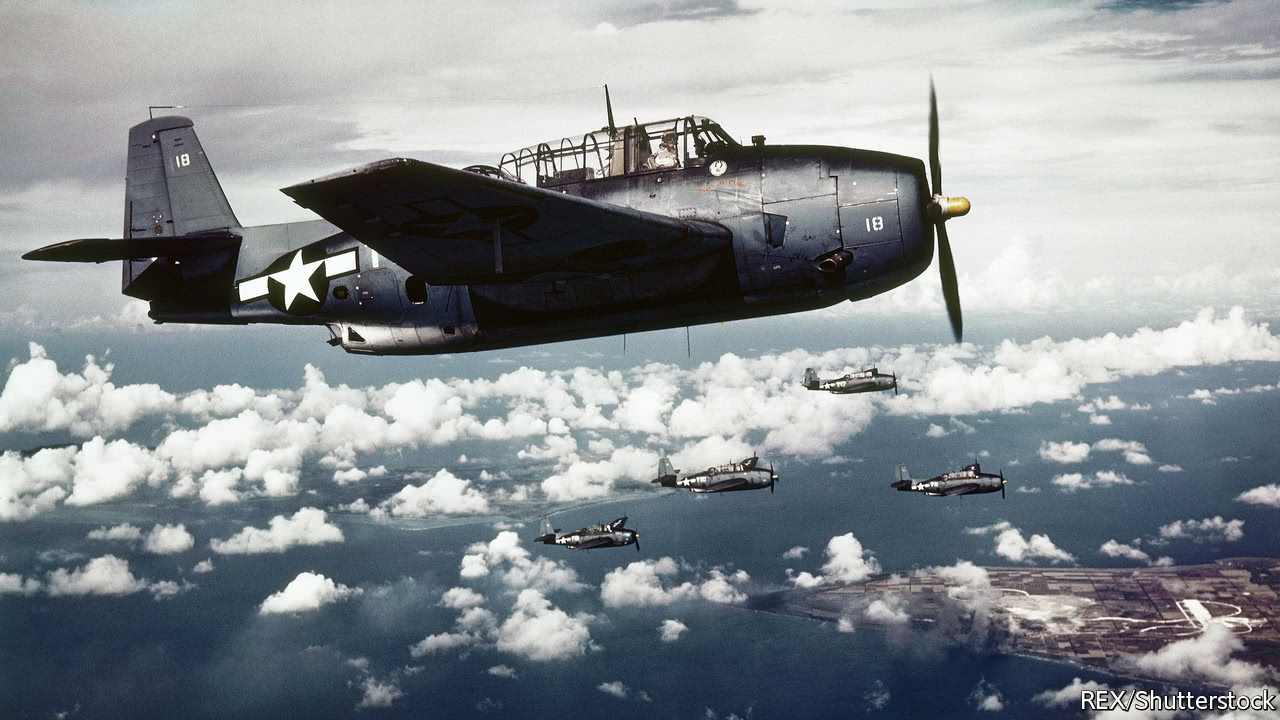Lessons from history at a Pacific Ocean outpost
A reminder that America chose its global role

A reminder that America chose its global role
"GLOBALIST" is a fashionable term of abuse in American politics just now. The world is full of haters, cheats and ingrates, powerful voices declare. Walls are beautiful. Openness is for fools.
To turn inwards, thanking providence for a homeland shielded by two oceans, is a tradition with deep roots. But it is not the only American way. To land at the United States Air Force airfield on Wake Island, a green and turquoise speck of coral in the dark vastness of the Pacific, is to be reminded that America has been a global, maritime power for more than a century. Openness is an American tradition too, of a swaggering, risk-taking, profit-mixed-with-patriotism kind.
Your blogger landed on Wake Island aboard a blue and white air force jet carrying the chairman of the joint chiefs of staff, General Joseph Dunford. This is American territory, claimed by a naval gunboat in 1899 and maintained today as an aircraft refuelling stop and test site for missile defence systems. It has fewer than 100 residents, all of them either military personnel or government contractors, and its ruler is a polite young air force captain, Marc Bleha.
At the height of the Korean War, more than 100 airplanes landed on the atoll each day. America's most senior officer, General Dunford is a marine, dubbed "fighting Joe" as a hard-driving commander in Iraq. Squinting at the surf as his plane is refuelled, he points out memorials and bunkers that bear witness to the marines, navy personnel and contractors who held off a vastly larger Japanese force for 16 days, at the start of the Pacific war. To his left stands a whitewashed monument to those marines, inscribed with a terse wartime message: "Enemy on Island, Situation in Doubt". Long-ago crashes and wrecks are recalled by rusting aircraft engines and anchors, lined up on the coral foreshore.
But the island is more than a fortress. It was claimed for the United States at the height of America's flirtation with imperialism, soon after the annexation of Hawaii and the capture of Guam and the Philippines from Spain. From the start it was examined for both military and commercial potential, as a possible telegraph station and coaling stop for warships and merchantmen. A brief taste of glamour came in the 1930s, when Pan-American Airlines blasted a channel for flying boats in its coral lagoon, and built a hotel, pool and resort for passengers taking its island-hopping Clipper service to China. The US Navy quietly encouraged PanAm's work, as admirals fretted about an increasingly assertive Japan and planned for war.
Today it has a more spartan feel. The flight movement board in the passenger terminal is blank, beneath a line of clocks that show the time in such far-off spots as Auckland, London and Washington, DC. With no passengers to serve, a baggage handler cheerfully offers to stamp passports with a Wake Island arrivals stamp. The resident workers (there are no children) report excellent fishing and scuba-diving off the reef. Still, this is an island of ghosts, says Barbel Graham, a contract cook from Texas who has spent three years there. "You respect what happened here. You can feel the atmosphere sometimes," she confides. From her window in the housing camp known as "downtown", Ms Graham can see the beach where 98 American prisoners of war were lined up and machine-gunned by Japanese occupiers in 1943.
Not all the history is so dark. Back in 1975, as Saigon fell, the atoll was used as a refugee inspection station for some 15,000 Vietnamese airlifted to new lives in America. That act of (limited) generosity paid dividends. Captain Bleha volunteers that his commanding officer, who is stationed in Alaska with the air force unit that oversees the atoll, was himself a refugee from Vietnam. Born to an American father and a Vietnamese mother, the captain's commanding officer remembers passing through Wake Island as a child.
This improbable scrap of American rock, with its sun-faded airport fire trucks, yellow school bus and tiny post office, speaks to a history that some would forget. America is a Pacific nation, though rivals such as China wish otherwise, yearning to push a weary superpower out of its region, and back towards its continental fastness. It was not naïve idealism that led America to project power far beyond the horizon: entrepreneurs and military men share equal billing in Wake Island's story, and those adventurers made their home country safer and more prosperous. America was not tricked into a global role, it chose one.
No comments:
Post a Comment